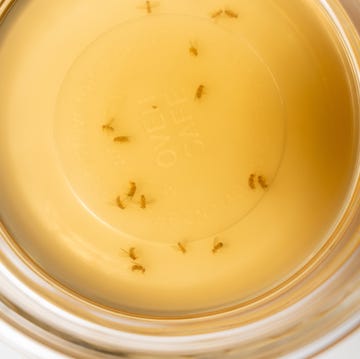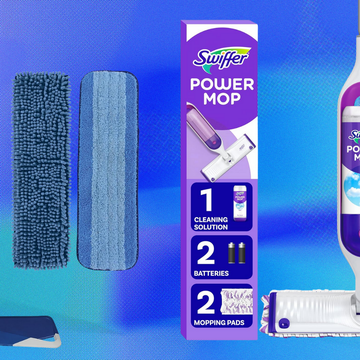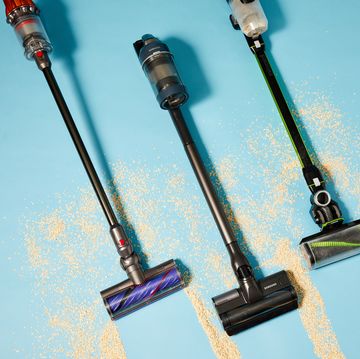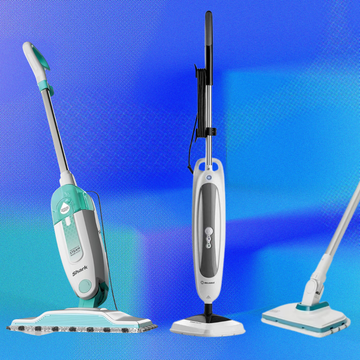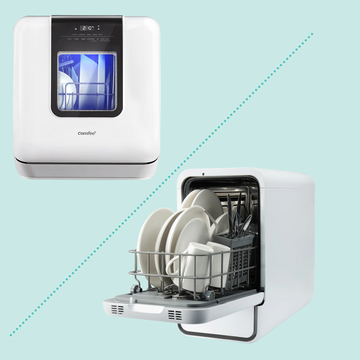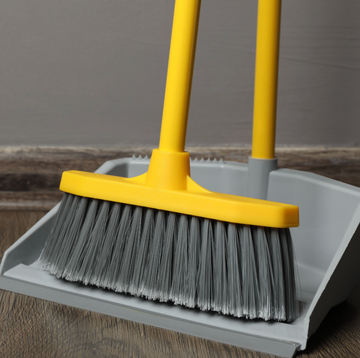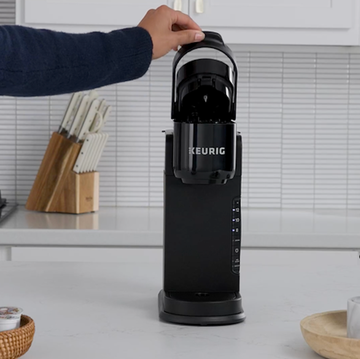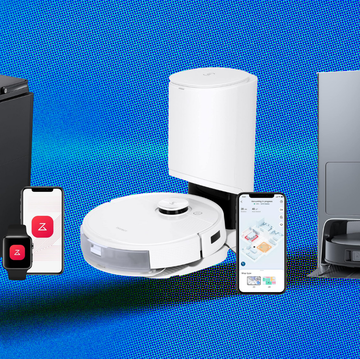1Clean out bits of food daily.
 brizmaker//Getty Images
brizmaker//Getty ImagesFood debris lingering at the bottom of your dishwasher is the most common cause of bad odors. Take a few minutes after each dishwashing cycle to check for any remaining bits of food, paper, or small items that could have gotten stuck in the filter well or screen. Remove any reside with a paper towel to help prevent buildup.
Expert tip: To prevent a smelly dishwasher, wipe excess food from all items—silverware, bowls, plates, etc.—before loading the dishwasher. If you don't plan to run a cycle immediately, rinse dishes at the sink or run a rinse-only cycle. Always remove any labels or stickers from jars you may be reusing before running a cycle.
2Wipe door and door gasket weekly.
 Daniel de la Hoz//Getty Images
Daniel de la Hoz//Getty ImagesPrevent odors, mold, and bacteria growth by regularly wiping the dishwasher's interior, including the door, door gasket, and dispenser. You may also notice greasy residue or splatters on the handle or the dishwasher control buttons. Quickly wipe these areas with a damp microfiber cloth or sponge. Pay attention to the dispenser for any debris or undissolved detergent.
As for the door gasket and dispenser, gently scrub any gunk from the rubber seal around the door using an old soft toothbrush dipped in either warm, sudsy water or a mild all-purpose cleaner.
Advertisement - Continue Reading Below
3Clean the dishwasher filter weekly.
 Yuliya Sheynina//Getty Images
Yuliya Sheynina//Getty ImagesEvery dishwasher has a filter typically found below the bottom spray arm—you'll need to pull out the bottom rack to reach it. If you're not sure how to find or remove it, check the owner's manual or manufacturer's website for details.
- Unlock and remove the filter and rinse it under hot running water. You can also swish it in warm sudsy water.
- Using a soft toothbrush, scrub the mesh screen and plastic frame to remove any grease or particles stuck in the crevices. Then rinse it clean.
- Lock the filter back into place.
Expert Tip: Never operate your dishwasher without the filter properly locked, as you can cause severe damage to your machine and possibly void the warranty.
4Run a cleaning cycle monthly.
 Ivanna Maksymchuk//Getty Images
Ivanna Maksymchuk//Getty ImagesConsider this a monthly deep clean to remove any trapped particles, mineral buildup, or detergent residue hiding in your machine's internal parts and spray arms. Dishwasher cleaners, like Good Housekeeping Seal Star Cascade, are an easy fix, as they contain surfactants that dissolve and clean away trapped food bits and greasy residue. Use them according to the label's directions.
Expert Tip: Check the instructions before using any commercial dishwasher cleaner. Most require an empty dishwasher, but some can be used in the same cycle with dishes and detergent for even more convenient cleaning.
Advertisement - Continue Reading Below
5Polish your dishwasher's exterior as needed.
 Fancy/Veer/Corbis//Getty Images
Fancy/Veer/Corbis//Getty ImagesFingerprints make any surface look dull and grimy, but they really stand out on stainless steel appliances. Use a stainless steel cleaner made specifically for appliances, like GH Seal Star Weiman, to shine up your dishwasher door and give it a protective finish. Not only does the cleaner leave behind a streak-free shine, but it also contains ingredients to help repel future dirt and smudges.
Expert Tip: Stay away from abrasive cleaners or pads that can scratch and mar your dishwasher's exterior. Always clean and wipe stainless steel in the direction of the metal's grain to avoid streaks.
How often to clean your dishwasher
Most people run a cleaning cycle once per month, but the frequency of cleaning your dishwasher may vary if you run a cycle more or less often. Assuming you run a load every day, here are the things to do daily, weekly and monthly:
- Daily or after every load: Remove visible bits of food from inside the filter well and the bottom of the dishwasher.
- Weekly: Wipe down the door edges and gasket to get rid of any debris, and remove and clean the filter.
- Monthly: Deep-clean the interior with a cleaning cycle.
- As needed: Wipe the exterior, edges, and interior of drips, spots and film.
Advertisement - Continue Reading Below
Can you deep-clean your dishwasher with vinegar?
You can fight residue and buildup with white vinegar in an empty dishwasher.
- To clean your dishwasher with vinegar, place a dishwasher-safe bowl filled with one cup of distilled white vinegar on the top rack and run a pots-and-pans or heavy (hot) cycle without detergent or dishes.
- To clean your dishwasher with vinegar and baking soda for extra freshening, after running the vinegar cycle, sprinkle a cup of baking soda in the bottom of your empty dishwasher and run a short or quick cycle.
Can you clean your dishwasher with bleach?
No, bleach and bleach-containing cleaners are not recommended, especially if the dishwasher has a stainless steel interior. Some dishwasher detergents contain bleach, but that's to remove tea and coffee stains from cups and other dinnerware. And do not use bleach with vinegar—the combination of the two can create potentially lethal chlorine gas.

Alyssa Gautieri (she/her) is the associate lifestyle editor for Good Housekeeping, where she covers all things home and interior design. Prior to joining GH in 2022, she wrote for publications including ELLE Decor, Chairish, BobVila.com, Unique Homes Magazine and LODGING Magazine, in addition to crafting product copy for home brands like BrylaneHome and VIGO Industries.
Advertisement - Continue Reading Below
Advertisement - Continue Reading Below
Advertisement - Continue Reading Below


